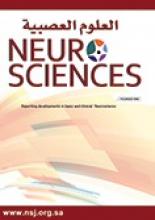Abstract
Myasthenia gravis is a disorder of impaired neuromuscular transmission resulting in weakness and abnormal fatigability on exertion, improved by anti-acetyl cholinesterase drugs. A number of drugs are known to exacerbate myasthenia gravis or interfere with neuromuscular transmission. We report a case of D-penicillamine induced myasthenia gravis who developed ptosis, diplopia and easy fatigability, 4 years after initiation of the drug for Wilson’s disease. On stopping the drug, within 3 months all her symptoms disappeared without any anti-acetyl cholinesterase drugs. Thus, the onset of drug induced myasthenia gravis could be insidious but the withdrawal of the drug leads to rapid recovery.
- Copyright: © Neurosciences
Neurosciences is an Open Access journal and articles published are distributed under the terms of the Creative Commons Attribution-NonCommercial License (CC BY-NC). Readers may copy, distribute, and display the work for non-commercial purposes with the proper citation of the original work.






